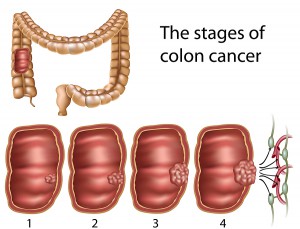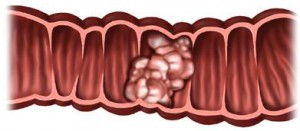Colon cancer begins when normal cells in the lining of the colon or rectum change and grow uncontrollably, forming a mass called a tumor. A tumor can be benign (noncancerous) or malignant (cancerous, meaning it can spread to other parts of the body). These changes usually take years to develop; however, when a
Causes of colon cancer?
Risk factors for colorectal disease include old age, a history of colitis or Crohn’s disease, a family history of the cancer, and smoking. Some studies have also linked diets high in animal fat, and low in fruits, vegetables and fibre to an increased risk.
Blood in stool -This is the main sign of colon cancer as well as for other types of cancer. Dark patches or blood in stool or on it is the main sign of colon cancer.
Anaemia -Blood in stool translates to loss of blood in your body. This will result in lack of blood, which means anaemia is another sign of colon cancer. Anaemia in colon cancer patients needs to be improved to fight cancer and increase survival chances.
Fatigue -Fatigue is one sign that affects most of us, but that doesn’t imply that we all have colon cancer. If you feel fatigue accompanied by other signs of colon cancer then you should be worried.

Change in bowel movement -This can be an agonising problem; change in bowel movement means you have to change your eating habits, which includes that you may have to skip on certain favourite food. Change in bowel movement simply means you may experience constipation, diarrhea, a sense that your bowel is not empty, rectal cramping, urgency to visit the washroom.
Obesity – Obesity has been identified as a risk factor for colon cancer.

Radiation treatment after surgery does not help people with colon cancer, but it does prolong survival for people with rectal cancer.
- Given before surgery, radiation may reduce tumor size. This can improve the chances that the tumor will be removed successfully.
- Radiation before surgery also appears to reduce the risk of the cancer coming back after treatment.
Advantages of Minimal Invasive Laparoscopic Colon Cancer Surgery

The benefits of minimally invasive colorectal surgery versus open-abdominal procedures include:
- Less pain
- Less injury to tissue
- Minimal scarring
- Less blood loss
- Shorter hospital stay
- Faster return to normal activities
To know more about Colon cancer Treatment in India please visit this link : http://www.safemedtrip.com/medical-services/cancer-treatment-in-india/colon-cancer-treatment-in-india.html

 Click to WhatsApp
Click to WhatsApp +91-9899993637
+91-9899993637



